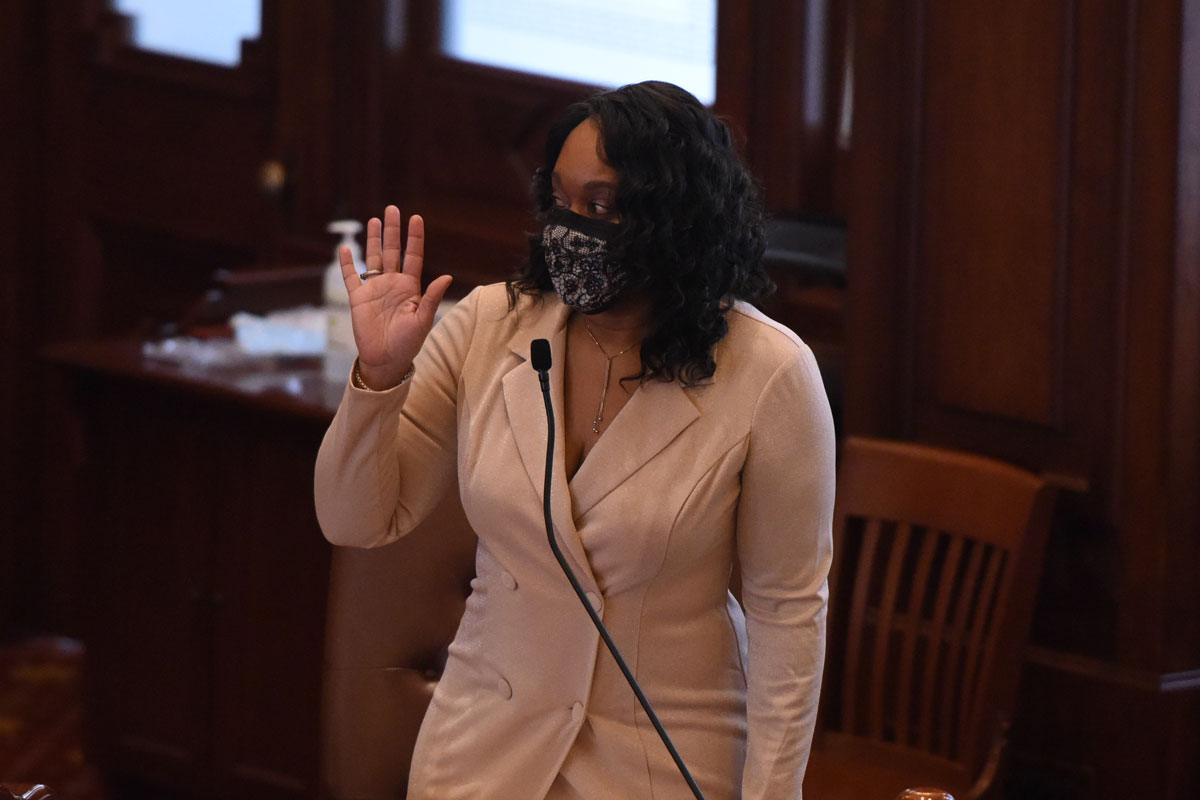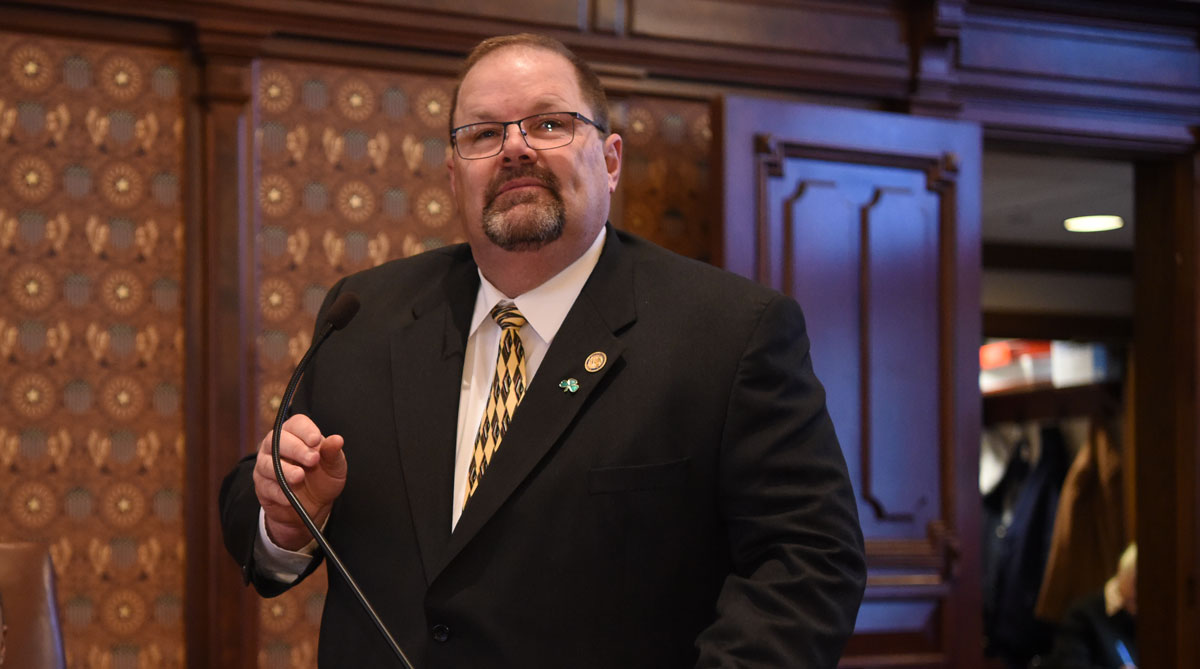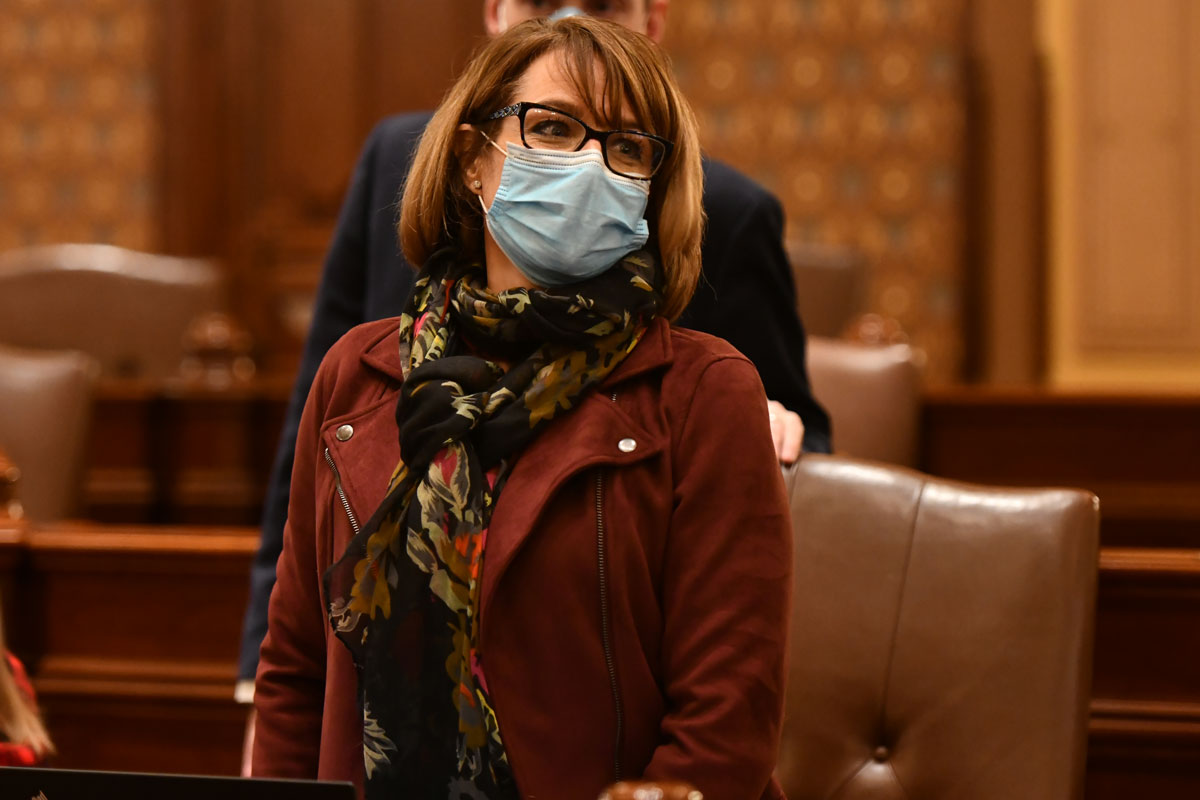- Details
- Category: Senator Jennifer Bertino-Tarrant News
 With the start of the 102nd General Assembly, we are saying farewell to several of our colleagues who are moving on to new opportunities. We will miss their contributions, commitment and camaraderie, but wish them nothing but more success in the future.
With the start of the 102nd General Assembly, we are saying farewell to several of our colleagues who are moving on to new opportunities. We will miss their contributions, commitment and camaraderie, but wish them nothing but more success in the future.
- Details
- Category: Senator Kimberly A. Lightford News
 SPRINGFIELD – Senate Majority Leader Kimberly A. Lightford was sworn in Wednesday for a new term in the Illinois General Assembly, marking the beginning of her 23rd year in the legislature.
SPRINGFIELD – Senate Majority Leader Kimberly A. Lightford was sworn in Wednesday for a new term in the Illinois General Assembly, marking the beginning of her 23rd year in the legislature.
A steadfast advocate for education reform and working class Illinoisans, Lightford’s new term begins days after passing legislation to help ensure Black children receive the opportunity they need to build brighter futures, a measure Lightford negotiated during her recent tenure as chair of the Illinois Legislative Black Caucus. It makes comprehensive changes to support Black and low-income students from birth to adulthood, the latest in a long line of education reforms Lightford has championed.
Read more: Leader Lightford sworn in for new term in Illinois Senate
- Details
- Category: Senator Don Harmon News
 SPRINGFIELD — Oak Park Democrat Don Harmon was re-elected President of the Illinois Senate on Wednesday, promising to continue delivering results for the people of Illinois and calling on his colleagues to focus on “jobs and justice” in the year ahead.
SPRINGFIELD — Oak Park Democrat Don Harmon was re-elected President of the Illinois Senate on Wednesday, promising to continue delivering results for the people of Illinois and calling on his colleagues to focus on “jobs and justice” in the year ahead.
“It’s about making sure our people aren’t forgotten by our economy, or caught up in the cogs of the system to be lost forever,” Harmon said during the Senate’s COVID-19 restricted inauguration ceremony at the state Capitol. “Every day in this state, too many people wake up feeling like the deck has been stacked against them.”
Harmon, 54, was first elected Senate President a year ago to serve out the term of the retiring John Cullerton. On Wednesday, Harmon’s Democratic colleagues re-elected him. In a move to show Senate bipartisanship, Harmon voted for Republican Leader Dan McConchie, and McConchie voted for Harmon.
- Details
- Category: Senator Don Harmon News
 SPRINGFIELD – Senate President Don Harmon (D-Oak Park) issued the following statement after the General Assembly passed sweeping legislation championed by the Illinois Legislative Black Caucus to address systemic racism:
SPRINGFIELD – Senate President Don Harmon (D-Oak Park) issued the following statement after the General Assembly passed sweeping legislation championed by the Illinois Legislative Black Caucus to address systemic racism:
“In a system purposefully and permanently designed to contain all but incremental change, we have accomplished something sweeping in scope and dramatic in impact.
“The members of the Illinois Legislative Black Caucus, working with the Latino Caucus, led the way in developing a package of legislation that attacks the root of the racism that is systemically embedded in every aspect of our lives.
Read more: Senate President Harmon statement on success of Black Caucus agenda
- Details
- Category: Senator Patrick Joyce News
 SPRINGFIELD – State Senator Patrick Joyce (D-Essex) released the following statement after the Senate passed a package of criminal justice reform legislation – House Bill 3653 – in the early hours Wednesday:
SPRINGFIELD – State Senator Patrick Joyce (D-Essex) released the following statement after the Senate passed a package of criminal justice reform legislation – House Bill 3653 – in the early hours Wednesday:
“I believe in reform, and I was actively involved in the negotiations of House Bill 3653. I contacted municipalities, pastors, the NAACP and law enforcement in my district to get their input and concerns, and brought that feedback directly to the sponsor so it would be considered as measures were drafted.
“When it came time to vote, I was concerned that a ‘no’ vote might have signaled that I do not think reform is needed—but I was not comfortable voting ‘yes’ on legislation that clearly needed more time and work. I therefore made the conscious choice not to vote on the legislation.
Read more: Joyce demands transparency following the passage of criminal justice reform bill
- Details
- Category: Senator Meg Loughran Cappel News
 Plainfield – State Senator Meg Loughran Cappel (D- Shorewood) was proud that one of her first votes was to prohibit school district employees and independent contractors from disciplining children by secluding them in a locked or unlocked space.
Plainfield – State Senator Meg Loughran Cappel (D- Shorewood) was proud that one of her first votes was to prohibit school district employees and independent contractors from disciplining children by secluding them in a locked or unlocked space.
“Studies show that isolating students as punishment does not change behavior,” said Loughran Cappel, who served on the Joliet Township High School Board, including its discipline committee. “This legislation will protect our students from the harmful mental health effects of seclusion rooms.”
Specifically, the legislation would ban all isolated seclusion practices and ban the use of physical restraints that could impair a student’s ability to breathe or speak normally. It would still allow for timeouts with a trained adult in the room with an unlocked door for therapeutic reasons or to protect the safety of students and staff.
“I commend my colleagues for helping pass this legislation to protect our most vulnerable students,” Loughran Cappel said. “All our children deserve to be treated with dignity and respect.”
The measure, House Bill 2263, has passed the Senate and now returns to the Illinois House for further consideration.
- Details
- Category: Senator Mattie Hunter News
 SPRINGFIELD – Following a year of grave racial injustice and the tragedies of the continuing COVID-19 pandemic, State Senator Mattie Hunter (D-Chicago) passed legislation out of the Illinois Senate aiming to improve equity in the state health care system.
SPRINGFIELD – Following a year of grave racial injustice and the tragedies of the continuing COVID-19 pandemic, State Senator Mattie Hunter (D-Chicago) passed legislation out of the Illinois Senate aiming to improve equity in the state health care system.
“For weeks upon weeks, we’ve listened to health care experts break down all the disparities in our health care system that exist for Black, Brown and low-income Illinoisans,” Hunter said. “Everyone deserves the same access to health care, regardless of race or socioeconomic status. This measure is meant to ensure the health care system will be centered fully on the needs of the patients.”
Read more: Hunter passes legislation to eliminate health care disparities for people of color
- Details
- Category: Senator Robert Peters News

SPRINGFIELD – The Illinois Senate passed a sweeping criminal justice reform package Sunday as part of a larger plan authored by the Illinois Legislative Black Caucus to rid Illinois of systemic racism. The package included the elimination of cash bail, an issue for which State Senator Robert Peters (D-Chicago) has been fighting for years.
“For too long, people in this state have spent time in jail only because they could not afford to pay their bail,” said Peters, who was recently elected Chair of the Senate Black Caucus. “The end of that practice is near. I’m thrilled that ending cash bail was part of the package we passed today, and I look forward to similar action from the House.”
Earlier this year, Peters filed Senate Bill 4025, known as the Pretrial Fairness Act, which was then folded into the criminal justice reform package. This portion of the bill eliminates cash bail as an option for pretrial detention and provides a presumption of pretrial release for all criminal defendants. The court retains the right to deny release under certain circumstances, pending the outcome of a hearing.
Read more: Peters celebrates ending cash bail as criminal justice package moves to House
More Articles …
Page 572 of 762